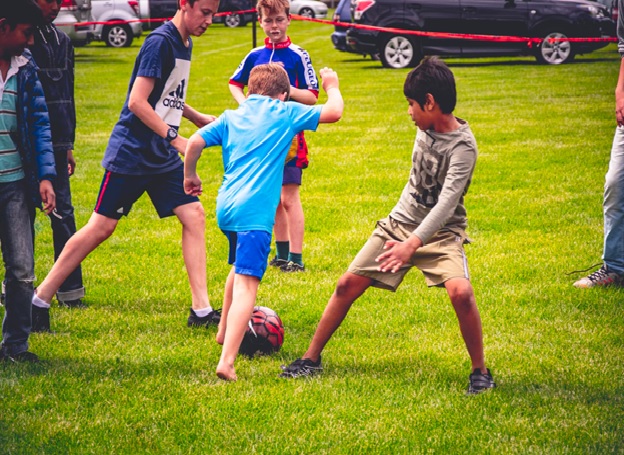Did you know that around 200,000 teeth are knocked out in sports-related accidents every year? A good athletic mouthguard can help protect your teeth from being damaged or knocked out while playing sports.
Keep reading to learn more about the different types of mouthguards and how they can help kids (and adults) stay safe on the playing field.
But first, if you are looking for a dentist in Raleigh, NC, New Hope Dental Care is here to help. While recognized for our cosmetic dentistry in Raleigh, NC, we are also a comprehensive dental practice offering a full range of services, from preventive to restorative and everything in between.
Okay, let’s get started!
Why Wear a Mouthguard?
Mouthguards work by absorbing the force of a blow to the face, which lessens the chance of getting a concussion or sustaining other injuries to the teeth, jaws, and head. According to the ADA, most sports-related dental injuries happen to boys between the ages of 10 and 14.
But people of all ages who play contact sports or participate in other recreational activities that might involve a fall or blow to the face should wear a properly fitted mouthguard. Here are the main benefits:
They Protect Teeth
Okay, this one is obvious. A good mouthguard can help prevent your child’s teeth from being chipped, fractured, or knocked out entirely. Without a mouthguard, injury is likely to occur. If it does occur, cosmetic dentistry in Raleigh, NC can help, but it is always better to prevent an injury in the first place.
They Prevent Concussions
Mouthguards don’t just protect teeth; they can also help reduce the risk of concussions. A 2012 study published in the Journal of Athletic Training found that football players who wore mouthguards were less likely to suffer a concussion than those who didn’t wear one.
They Lessen the Severity of Jaw Injuries
When a hard object hits the jaw, it can cause the soft tissue around the teeth to tear. This type of injury is called a concussion of the jaws and can be extremely painful. A mouthguard can help absorb some of the impact and lessen the severity of this type of injury.
Now that we’ve covered the basics, let’s take a closer look at the different types of mouthguards and how to choose the right one for your child.
Types of Mouthguards
There are three main types of mouthguards: stock mouthguards, boil-and-bite mouthguards, and custom-made mouthguards.
Stock Mouthguards
Stock mouthguards are pre-formed and ready to wear. They aren’t as comfortable as other types of mouthguards and don’t fit as well because they’re one size fits all. However, they’re usually less expensive than custom-made or boil-and-bite mouthguards.
The best way to find a stock mouthguard that fits well is to try it on in the store before purchasing.
Boil-and-Bite Mouthguards
Boil-and-bite mouthguards are also pre-formed but can be fitted to your teeth by softening them in boiling water and then biting into them so that they take on the shape of your teeth.
These types of mouthguards provide better protection than stock mouthguards since they’re customized to fit your individual teeth. They can be bought at most sporting goods stores. What’s more, you can re-mold them if they don’t fit quite right the first time.
Custom-Made Mouthguards
Custom-made mouthguards are made by dentists or orthodontists from casts (molds) of your teeth so that they fit snugly over your upper teeth.
They offer the best protection since they’re specifically designed for your unique dental anatomy but they’re also usually more expensive than stock or boil-and-bite mouthguards. However, many dental insurance plans will cover at least a portion of the cost.
Mouthguard Care
Once you’ve chosen the right mouthguard for your child, it’s important to take care of it so that it lasts. Here are a few tips:
- Rinse it in cold water before and after each use.
- Store it in a rigid, perforated container (most come with one) so that it can air dry.
- Avoid leaving it in direct sunlight or in hot water since this can damage the material.
- Don’t chew on it since this can change its shape.
- Bring it to each dental appointment so that the dentist can check for fit and wear.
With a little bit of research, you should be able to find the perfect mouthguard for your child. And don’t forget, the best mouthguard is the one that’s worn consistently so make sure to encourage your child to wear it during all practices and games.
Conclusion
No matter what type of sport you play, it’s important to wear a properly fitted mouthguard to help protect your teeth from being damaged or knocked out. If you have any questions about which type of mouthguard is right for you or how to properly care for your mouthguard, be sure to ask your dentist at your next appointment.
Whether it’s general dentistry or cosmetic dentistry in Raleigh, NC, it’s best done at New Hope Dental Care.

